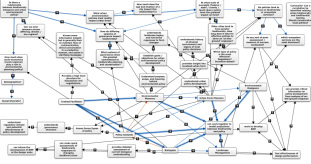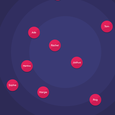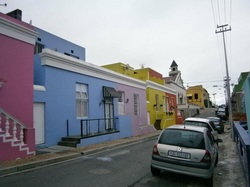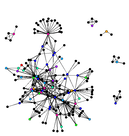
Mental Models in Interdisciplinary Research Teams
Beliefs are not held in a vacuum—individuals create mental models that structure their beliefs. Belief networks are a common key to understanding:
Beliefs are not held in a vacuum—individuals create mental models that structure their beliefs. Belief networks are a common key to understanding:
- how the public responds to new scientific information;
- why people engage in environmental behaviors ranging from recycling to protest; and
- what structures underlie successful collective governance programs.

Beyond the School Gate: Children’s Contribution to Community Integration.
With Mona Sakr, Lindsey Cameron, Jocelyn Dautel, Charlotte Haberstroh and Emily Murphy. This project looks at children's voices and impact on community integration through policy, art, and school. My portion of the project looks at the networks of friendships students have in their schools and in their community. We will examine both quantitative and qualitative data about their own impressions of what supports ties across community divides.
With Mona Sakr, Lindsey Cameron, Jocelyn Dautel, Charlotte Haberstroh and Emily Murphy. This project looks at children's voices and impact on community integration through policy, art, and school. My portion of the project looks at the networks of friendships students have in their schools and in their community. We will examine both quantitative and qualitative data about their own impressions of what supports ties across community divides.

Socio-ecological Movements in Urban Ecosystems
This project is a large collaboration in which I am working directly with Professors Mario Diani (University of Trento) and Henrik Ernstson (Stanford, University of Cape Town). The urban environment of Cape Town is contested along various dimensions of race, class and geography and presents an important case study to (i) learn about collective action processes in newly developing democracies, and (ii) how legacies of apartheid shape the structuring of civic networks. Drawing on a structural and relational network approach, we interviewed 120 civic associations mobilizing on a range of issues, including conservation of animals and habitat, the promotion of urban agriculture, and access to housing, water and sanitation.
This project is a large collaboration in which I am working directly with Professors Mario Diani (University of Trento) and Henrik Ernstson (Stanford, University of Cape Town). The urban environment of Cape Town is contested along various dimensions of race, class and geography and presents an important case study to (i) learn about collective action processes in newly developing democracies, and (ii) how legacies of apartheid shape the structuring of civic networks. Drawing on a structural and relational network approach, we interviewed 120 civic associations mobilizing on a range of issues, including conservation of animals and habitat, the promotion of urban agriculture, and access to housing, water and sanitation.

Social Welfare Law Advice, Community Connectedness, Equality and Well-being.
With Sarah Nason, Sara Closs-Davies, Lindsey Poole, and Edward Sharpe. This project looks at how individuals in different communities around England access legal advice though both official but especially through informal network ties.
With Sarah Nason, Sara Closs-Davies, Lindsey Poole, and Edward Sharpe. This project looks at how individuals in different communities around England access legal advice though both official but especially through informal network ties.
